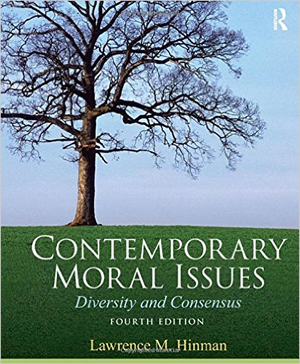Contemporary Moral Issues arose out of my teaching undergraduate ethics courses at the University of San Diego, and I was fortunate to benefit from the comments of many thoughtful undergraduates. The book still retains some of its signature elements, characteristics that I felt were essential to a good undergraduate ethics text:
- Narrative selections in all the chapters that help us to understand what it means to live through the issues under discussion;
- A balace among diverse moral voices, appropriate for the controversial nature of the issues under consideration;
- An emphasis on finding common ground among these various positions;
- An ethical self-inventory that allows students to determine their initial position and return to it later in the semester to see in what ways, if any, it has changed. This helps to create a moral autobiography, a theme mirrored in the narrative selections.
- An emphasis on getting to know the authors in this book through videos and other sources in order to appreciate the ways in which abstract arguments are often grounded in real persons.
- An emphasis on using the web to explore these issues, something to which my Ethics Updates website has been devoted since its inception in 1994, when I created and maintained the site with Notepad, writing the then-simply HTML code myself.
- An emphasis on scholarly sources, detailed in the bibliographical essays and expanded on the Ethics Updates website. In fact, as its name suggests, the website was designed to keep my two ethics texts up-to-date as new research became available.
- A strong emphasis on ancillary materials to help students to grapple with the difficult ideas presented in this book, including guides to the readings, PowerPoint presentations, and an ever-increasing number of diagrams that began life as scribbled notes on a white board, gradually became more legible in PowerPoint presentations, and now reside most comfortably on the website.
- An ever-increasing tendency for the book to move from the physical print format to the virtual, web-based medium.


